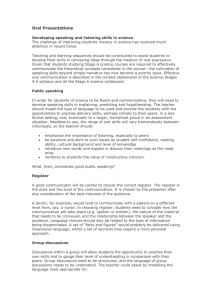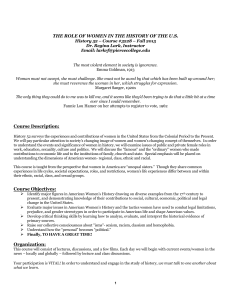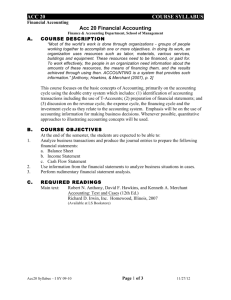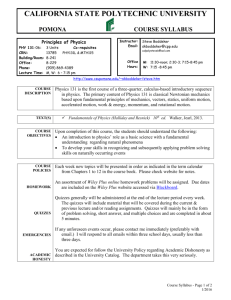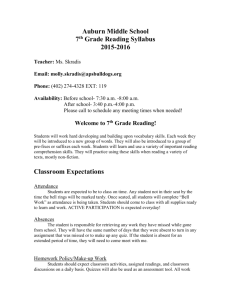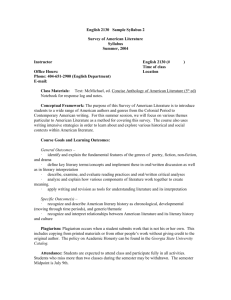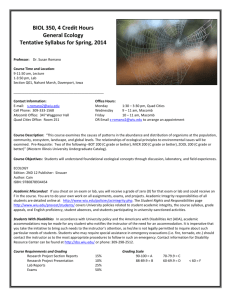Human Resource Management 353
advertisement
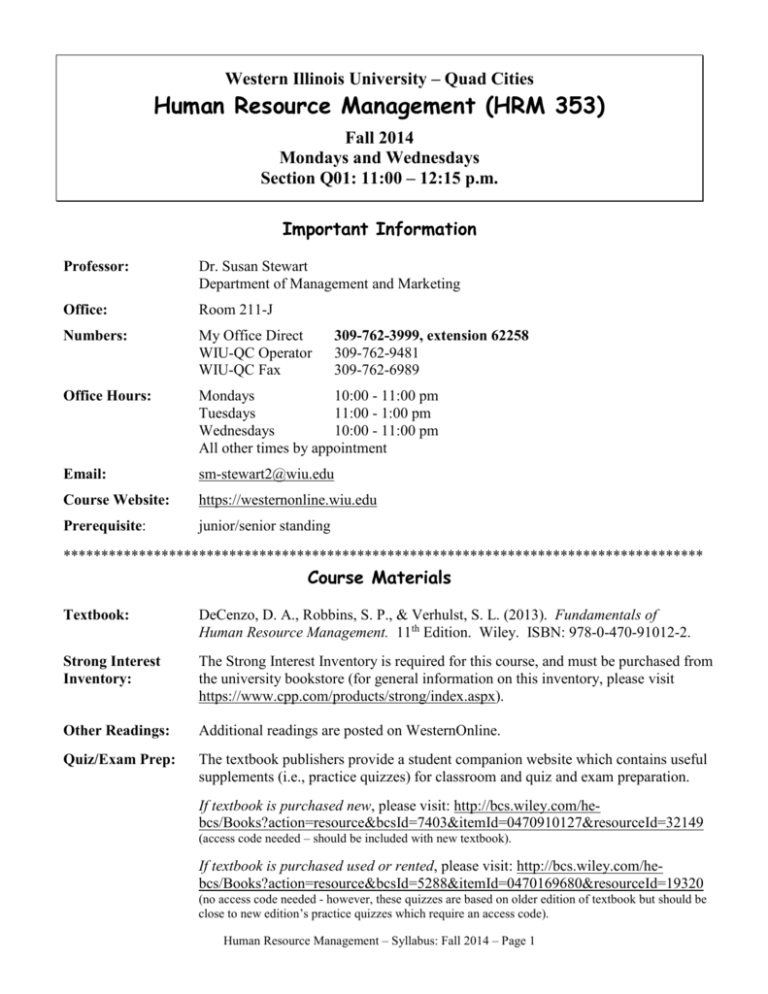
Western Illinois University – Quad Cities Human Resource Management (HRM 353) Fall 2014 Mondays and Wednesdays Section Q01: 11:00 – 12:15 p.m. Important Information Professor: Dr. Susan Stewart Department of Management and Marketing Office: Room 211-J Numbers: My Office Direct WIU-QC Operator WIU-QC Fax Office Hours: Mondays 10:00 - 11:00 pm Tuesdays 11:00 - 1:00 pm Wednesdays 10:00 - 11:00 pm All other times by appointment Email: sm-stewart2@wiu.edu Course Website: https://westernonline.wiu.edu Prerequisite: junior/senior standing 309-762-3999, extension 62258 309-762-9481 309-762-6989 ************************************************************************************* Course Materials Textbook: DeCenzo, D. A., Robbins, S. P., & Verhulst, S. L. (2013). Fundamentals of Human Resource Management. 11th Edition. Wiley. ISBN: 978-0-470-91012-2. Strong Interest Inventory: The Strong Interest Inventory is required for this course, and must be purchased from the university bookstore (for general information on this inventory, please visit https://www.cpp.com/products/strong/index.aspx). Other Readings: Additional readings are posted on WesternOnline. Quiz/Exam Prep: The textbook publishers provide a student companion website which contains useful supplements (i.e., practice quizzes) for classroom and quiz and exam preparation. If textbook is purchased new, please visit: http://bcs.wiley.com/hebcs/Books?action=resource&bcsId=7403&itemId=0470910127&resourceId=32149 (access code needed – should be included with new textbook). If textbook is purchased used or rented, please visit: http://bcs.wiley.com/hebcs/Books?action=resource&bcsId=5288&itemId=0470169680&resourceId=19320 (no access code needed - however, these quizzes are based on older edition of textbook but should be close to new edition’s practice quizzes which require an access code). Human Resource Management – Syllabus: Fall 2014 – Page 1 Course Description Human Resource Management is a specialization within the field of Management that encompasses several functions including the recruitment, selection, and maintenance of a qualified, motivated, and productive workforce. The effective performance of these functions requires understanding and skill in employment law, planning, job analysis, recruitment, selection, orientation, training, employee development, performance appraisal, compensation, benefits, safety, and labor relations. Even if you do not enter into a career in Human Resources, you should understand the topics covered in this course since the job of the general manager is to supervise people as well as financial and material resources. Since managers report that they spend about half their time dealing with "people-related" issues, it is important that you are introduced to the major topics associated with managing people in the context of the global marketplace. Furthermore, this course will be useful no matter what career path you pursue since it addresses issues that will have an impact on you in the workplace. Course Objectives This course is designed to help you to become a more effective manager (and employee) by building skills and raising awareness of critical human resource related issues. All material will be presented in the context of the current workforce - for example, we will discuss: • • • • • • • How does human resource strategy tie into overall organizational strategy? What legal issues must be considered when practicing human resource management/management? How is a changing workforce affecting the way employees are selected, trained, and promoted? How does domestic and international human resource management differ? What factors impact the design and implementation of compensation and benefit programs? How can employees become motivated? What should be done to prepare for a career in human resource management/management? These objectives and others will be accomplished through readings, lectures, discussions, class activities, videos, guest speakers, quizzes, and exams. Instructional Philosophy and Course Design “I hear and I forget. I see and I remember. I do and I understand.” This famous quote, attributed to Confucius, is used frequently to support the value of learning through experiences. The saying has some truth to it, but contemporary research on learning suggests a more acute rephrasing would be: “I understand best when I hear, see, and do!” Hence, I have designed the course to maximize your understanding and interest by using of a variety of instructional methods and am committed to creating a positive learning environment in the classroom. The course is divided into 3 parts – Human Resource Management in Perspective, Maximizing Human Resource Effectiveness, and Maintaining Human Resources – and topics are organized together to assist you in learning the material. Each of us is responsible for the success of this course. In order for you to maximize your learning experience, you will need to prepare for class: carefully read and critically think about the information provided, complete all assignments, be accountable to your classmates by being prepared for class (to enable them to learn from you and accomplish tasks effectively), be ready to participate in class, and attend class with a positive attitude. Please note that I will not have time in class to provide in-depth coverage of all of the assigned material (in short, we will not rehash assigned readings in class). Rather, we will explore the significance of some of the readings through class discussion and engage in activities to develop critical thinking and human resource management skills. The quizzes and exams, Human Resource Management – Syllabus: Fall 2014 – Page 2 however, will require in-depth knowledge of the assigned material as well as understanding how to apply the information (which will be learned via class assignments and discussions). I have high expectations as to your capabilities, professionalism, and commitment to learning this material! This course will make use of the WesternOnline course organization system, electronic mail, and the worldwide web. I assume that you have an email account, web browsing capability, and a word processor. The computer labs on campus contain these resources if you do not have them. Please make sure your email address is up-to-date in all university systems. I send important email messages to the class via the WesternOnline system and you are responsible for obtaining all such messages. Also, a copy of the overheads used by the professor throughout the semester and other course materials are available on the WesternOnline course site. Print and bring the overheads to each class (choose the “handouts” option before printing to place several slides onto each page). The purpose of these slides is to help you structure the material presented in class as well as to decrease your writing load so that you can listen and think as well as participate. Please be aware that the slides are not a substitute for attending class and only studying these slides is not sufficient for performing well. Student Participation I am depending on your involvement in all aspects of the class in order to enhance it for everyone. Participation is an important component of this class. Much of your learning will take place during class discussions and activities with the professor, guest speakers, and peers. Thus, it is very important that you prepare ahead of class and participate in the discussion of these materials. I expect everyone to contribute to the class (more about this later in the syllabus). One way to plan for making contributions is to prepare questions or comments about each reading or assignment that you want to have addressed during the class period. Consider submitting a Confusion Sheet (located on the course website). Formulate questions for the guest speakers based on the materials as well. Also, please be willing to respond to the questions and comments of your classmates. I expect that you will show respect for one another's contributions. While you may not agree with the perspectives of your peers, I expect that you will express your differences of opinions in ways that uphold the humanity of the person with whom you disagree. I believe that you will find that engaging in dialogue about areas of similar and differing points of view will create a positive learning experience in and of itself. I think that you will also find the process of working through and discussing issues together to be beneficial to your individual learning in the course. Furthermore, since most of you have work or school experience, I strongly encourage you to volunteer comments whenever you see a connection between course material and your own experiences. Don’t worry if your example seems far-removed or somehow silly; the examples are important for getting you used to applying course material to concrete situations. Your willingness to share your experiences makes the course more interesting and enjoyable for everyone. I want all students to meet other class members and guests, and to be very comfortable and involved. We all have different knowledge, skills, and experiences and we can all learn from one another! What you get out of the course is, however, ultimately up to you. If we both do our parts, this course will be a positive learning experience for all of us. Together we can make this a very delightful experience! Quizzes Assessing Knowledge of HRM Principles There will be six quizzes given throughout the semester to reward a “close reading” of the textbook chapters, with particular emphasis on understanding key terms and concepts. Items on the quizzes will be presented as true/false and multiple choice questions to resemble those on our course exams as well Human Resource Management – Syllabus: Fall 2014 – Page 3 as the Society for Human Resource Management (SHRM) Certification Exam. Study guides are available on the course website to assist in guiding your studying process. It is strongly recommended that you prepare your responses to the study guide items on a weekly basis. There is also a student companion website for our textbook (see first page of this syllabus for web address) that provides practice quizzes. There will be no make-up quizzes during the semester. Students will be expected to take quizzes in class when scheduled. Failure to take a quiz will result in a score of zero for that quiz. Exams Integrating HRM Principles There will be 3 in-class examinations that correspond to each part of the course. Each exam will be closed book with no notes allowed and worth 100 points. The exam questions will resemble the quiz questions in that they will be true/false and multiple choice questions that focus on key terms and concepts (like items on the SHRM Certification Exam). While you will have to “know” the material (call it memorization), more importantly you must “understand” the material (in other words, you will have to be able to apply it). Expect questions on the exams geared toward both types of knowledge. Going through your class notes and memorizing them will not be enough to do well on the exams. You must be able to integrate material and make connections across concepts, theories, and practice. Study guides are available on the course website to assist in guiding your studying process. It is strongly recommended that you prepare your responses to the study guide items on a weekly basis. There is also a student companion website for our textbook (see first page of this syllabus for web address) that provides practice quizzes. Furthermore, we will have a review session prior to each exam that will mimic the Jeopardy game show like the HR Games offered by SHRM. This should motivate and prepare you for the exams in this course as well as for the SHRM Certification Exam. I will be happy to discuss having students participate in the official HR Games and Certification Exam since they are important ways to build a resume, especially for those entering a career in human resources. Overall, you must be prepared to be an active participant in the exam review session. You will be asked to complete an assessment form after Exam 1 (located on the course website) to provide insights to the professor and to yourself about this exam as well as your specific methods of preparation. The form is meant to assist you in evaluating and identifying effective and ineffective study habits so that you can make any needed changes before future exams (the professor will provide assistance if necessary). This form will also provide the professor with midcourse feedback. If, for a university approved reason, you cannot take an exam at the scheduled time you must give me written notice at least one week in advance so that we can make arrangements for you to take the exam in the Testing Center. After making arrangements with the professor, you must phone the Testing Center directly to make an appointment to take the exam (309-762-9481). Please note that the Testing Center must have the test submitted by the professor prior to scheduling your appointment. If the situation does not allow for advance notification (for example, emergency hospitalization), contact me as soon as possible after a missed exam. Make-up exams for non-university approved reasons are not guaranteed. Failure to take any exam at the scheduled time will result in a score of zero for that exam. Main Topics: Exam 1: Human Resource Management in Perspective Equal Employment Opportunity (Chapter 3) Human Resource Planning and Job Analysis (Chapter 5) Recruiting (Chapter 6) Foundations of Selection (Chapter 7) Human Resource Management – Syllabus: Fall 2014 – Page 4 Exam 2: Maximizing Human Resource Effectiveness Socializing, Orienting, and Developing Employees (Chapter 8) Managing Careers (Chapter 9) Establishing Rewards and Pay Plans (Chapter 11) Employee Benefits (Chapter 12) Exam 3: Maintaining Human Resources Employee Rights and Discipline (Chapter 4) Establishing the Performance Management System (Chapter 10) Ensuring a Safe and Healthy Work Environment (Chapter 13) Understanding Labor Relations and Collective Bargaining (Chapter 14) Class Activities Applying HRM Techniques Acting as a Human Resource Manager at Stewart Incorporated, you will complete 6 “job” assignments throughout the semester to contribute to your learning of the required material via the application of the knowledge gained from the textbook and class discussions. These class activities are a key learning device for this course - they allow for individualized education and reflection that is otherwise not possible in a class with 25 or more students. These activities are located on the course website. It is expected that you will be prepared and approach these activities in a professional and businesslike fashion. Each class activity is worth 10 points. You must print (and review/prepare) these activities, and bring them to class on the date noted in the course outline – students will receive a zero for failing to do so. Students are not allowed to make up these points if unable to attend class or are not prepared to participate in class. Class Participation Sharing HRM Information Class participation scores will be evaluated based on: 1) the quality of each student's contribution to the classroom discussion, 2) attendance during class discussions and activities, and 3) classroom conduct. Class participation scores are worth a total of 80 points, and will be based on your ability to share prior work/life experience, make connections to current experiences, complete all readings and assignments, participate in class activities, and engage in meaningful discussions. Contributions (30 Points) - Students who consistently contribute to the classroom (i.e., at least once every class session) and advance discussions in a meaningful and productive way will receive the highest grades (80-100%, depending on quality of input). "Silent" Contribution: If you don't feel comfortable getting involved in discussions that take place in class, see me privately about strategies for increasing your involvement. One such strategy is “silent” contribution. Students may wish to supplement their oral classroom contributions for a given class period through contributing "silently" by submitting contributions to the professor within 24 hours of the end of the class period (e.g., a relevant newspaper clipping with description of why it is useful, a link to a relevant WWW site with description of why site is useful, etc.). As with in-class oral contribution, the "silent" contributions will be evaluated for quality. Note that "silent" contributions may be used as a supplement to class contribution, but do not substitute for class attendance. Completion of “Extra” Forms: Students will be asked to complete extra forms to provide feedback to themselves, to class members, as well as to the professor on several occasions throughout the course. Human Resource Management – Syllabus: Fall 2014 – Page 5 The completion of these “extras” will act as part of the course participation grade. There won’t be an exact numerical grade associated with each of these items, yet their completion will assist us in discussing key topics and engaging in class activities. They will also allow you to gain skills at providing/receiving feedback information. What’s the lesson here? As a human resource manager, oftentimes you are asked to take on some added responsibilities that may not be formally assessed in your workplace, yet nevertheless contribute to your job and work environment. Attendance (25 Points) - Woody Allen said “Eighty percent of success in life is showing up”. Oftentimes topics will be discussed in class that are not covered in the readings and you will be responsible for this material. Since there will be quizzes, exams, and other activities in class that will directly impact your grade, attendance will be critical to being successful in this course! There is a penalty for missing classes. This is because your absence negatively affects your classmates’ experience. Three absences during the semester will result in a large deduction from your attendance score, with a zero score given for individuals who miss more than three classes. Showing up after class has begun will count as an absence, as will leaving early. The two-absence allowance should give you enough flexibility to deal with unexpected illness or emergency. If you are likely to have some regularly scheduled event during class sessions, you should take this course during a different semester. In the event that you are absent, it is your responsibility to get the course notes, handouts, etc. from another student or the course website. Classroom Conduct (25 Points) - Remember common courtesy at all times. Specifically, please: • Do not talk while others are speaking. • Show respect and consideration for other students, the professor, and any class visitors. • Arrive before class begins. • Turn off cell phones, pagers, and other electronic devices. Laptop computers are permitted if used for note-taking purposes only (it may not be used for checking email messages or surfing the internet during class time). The professor reserves the right to request a printout of the notes taken in class on the laptop computer. • Contribute to the learning of other class members. • Ask questions when you do not understand the material, the assignment, or anything else in class. This may be accomplished by asking me (before, during, or after class), by asking other class members, or by sending me an email message. Human Resource Management – Syllabus: Fall 2014 – Page 6 Grading Understanding Strengths/Areas for Improvement Please use the space provided to record/track your grades in this course. Grading Components: Points Possible Exams Exam 1 Exam 2 Exam 3 100 100 100 Quizzes Quiz 1 Quiz 2 Quiz 3 Quiz 4 Quiz 5 Quiz 6 10 10 10 10 10 10 Class Activities Activity 1 Activity 2 Activity 3 Activity 4 Activity 5 Activity 6 10 10 10 10 10 10 Class Participation 80 TOTAL 500 Points Received Grading Criteria: Your work will be assessed based upon your performance level or points earned as shown in the table below. Remember that I do not “give” grades; rather, you earn your grade. Grading Criteria Grade A AB+ B BC+ Points Earned 468-500 448-467 433-447 418-432 398-417 383-397 Percent Earned 94-100 90-93 87-89 84-86 80-83 77-79 Performance Level Student demonstrates excellent performance in written work and oral discussions. Content, organization, originality, analysis, demonstration of understanding, and application of course material significantly exceed the minimum requirements. Student demonstrates above average performance in written work and oral discussions. Student exceeds the minimum requirements in some, but not all of the above mentioned areas. Human Resource Management – Syllabus: Fall 2014 – Page 7 C CD+ 368-382 348-367 333-347 74-76 70-73 67-69 D DF 318-332 298-317 0-297 64-66 60-63 0-59 Student demonstrates average performance in written work and oral discussions. Student has satisfactorily completed the content and structure of the assignments. Student demonstrates below average performance in the quality of the written and oral discussions. The quality of work is not acceptable for a college student. General Comments and Policies Availability of Graded Items - All graded items will be returned in class except for the last exam since this is taken at the end of the semester. If you miss a class where any items are returned, please get them from the professor at her office. Incomplete Grades - There will be no incompletes given out at the end of the semester. Students who feel their situation requires an incomplete at the end of the semester should speak to the professor. Regrading Policy - Any complaints concerning grading should be called to the immediate attention of the professor in the form of a regrade request. If you believe your score on a graded item contains an error, you must submit a written analysis of why you believe the item should be regraded along with as much documentation from the readings and other sources as possible to support your claim. Simply sending a note asking the professor to ‘recheck #xx’ is insufficient. The regrade request must be given to the professor, in writing, no later than one class period after the graded item is returned to the student. For any regrade instance, the score on the regrade will be final. Keys to Success for this Class - Students who are successful in this course normally do the following: 1. Ask questions. This is the most important thing you can do. Make certain you ask questions when you don't understand the concepts being presented. Also ask questions if you don't understand an assignment. If you are unclear about what is important, ask a question. If you don't ask questions, I can only assume that you understand the material and assignments. If you don’t come see me, I can’t help you be successful. 2. Work on the assignments early. You should get organized and work on upcoming assignments immediately. Securing a regular study time dedicated to this course may be more difficult than you think given your busy schedule. If you put the assignments off, you will be in the uncomfortable position of not assembling the important information you need for a successful outcome. Research, creativity, and morale will also likely suffer. 3. Get help. You are welcome to ask the professor for help and feedback with assignments via the phone, email, or in person. Email is only useful to a point and email feedback may be fairly brief. You should follow up in person or by phone for further clarification. Make certain you are responsive to the feedback provided. 4. Think of examples. When in class or when studying, try to develop your own examples of the human resource concepts. It is especially useful to think of how the class discussion applies to your assignments and internship/work experiences. Ask for feedback on your examples either in class or via email. 5. Talk to me. If something is bothering you, please let me know. I can't help you or improve the course if you don't inform me of problems. Human Resource Management – Syllabus: Fall 2014 – Page 8 Honesty and Honor Code - The reputation of WIU and your degree depend on the academic and ethical standards of the University. Future business leaders have a special obligation to ensure their ethical standards are beyond reproach. Anyone engaging in activities that threaten this reputation will be reported to the University authorities. These activities include, but are not limited to, representing someone else’s work as your own or allowing your work to be represented as someone else's. You are encouraged to discuss assignments with classmates or the professor as a means for improving your thinking about the topics addressed, but you are ultimately responsible for the work. You should understand the appropriate University policies, including what qualifies as plagiarism and how to report acts of academic dishonesty. Please see http://www.wiu.edu/policies/acintegrity.php for details. Disability Accommodations – In accordance with University policy and the Americans with Disabilities Act (ADA), academic accommodations may be made for any student who notifies the instructor of the need for an accommodation. For the instructor to provide the proper accommodation(s) you must obtain documentation of the need for an accommodation through the Disability Resource Center (DRC) and provide it to the instructor. It is imperative that you take the initiative to bring such needs to the instructor's attention, as he/she is not legally permitted to inquire about such particular needs of students. Students who may require special assistance in emergency evacuations (i.e., fire, tornado, etc.) should contact the instructor as to the most appropriate procedures to follow in such an emergency. Contact the DRC at 309-762-9481 or 309-298-2512 for additional services. On-Campus Counseling - Confidential counseling is available to students free of charge. Call 309762-9481 to make an appointment if needed. Career Services - The Career Services Office prepares individuals to market themselves to prospective employers and provides information on career planning issues, job-market trends, interviewing, résumé writing, and other career-related topics. Take advantage of this service by visiting http://www.wiu.edu/student_services/careers and calling 309-762-9481 to make an appointment. Society for Human Resource Management - The Society for Human Resource Management (SHRM) is the world’s largest human resource management association (http://www.shrm.org). SHRM provides education and information services, certifications, conferences and seminars, government and media representations, and online services and publications to more than 250,000 professional and student members throughout the world. Interested persons are encouraged to join this national organization as well as the local Quad Cities SHRM Chapter (https://www.grhra.org) and the WIU SHRM Student Chapter (http://www.wiu.edu/cbt/management_and_marketing/shrm). This is a great way to build your resume and meet HR folks! Please check our WesternOnline course site for information on these and other professional organizations in the area of human resources. Get Certified! Many students take one of the certification exams offered from SHRM after taking this course – this is highly recommended as a way to set yourself apart from others and show employers that you possess knowledge of human resources! Check with your current employer to see if they will pay the exam fee (for your professional development). Also, the SHRM Foundation offers student scholarships to cover the cost of the exam fee and even the SHRM Learning System study materials. If you have HR experience, then consider taking the PHR Certification Exam: http://www.hrci.org If you do not have HR experience, then consider taking the Assurance of Learning Exam: http://www2.shrm.org/assuranceoflearning/index.html Human Resource Management – Syllabus: Fall 2014 – Page 9 Human Resource Management (HRM 353) Fall 2014 Semester Schedule Date Topic Readings Assignments Introduction to Human Resource Management M 8-25 W 8-27 M 9-1 Overview of Course and Introductions Strategic Human Resource Management Video/Discussions Skim Chapters 1-2 (these chapters are provided on WO if you do not have book yet) -Information Sheet Due -Review syllabus, class activities, textbook, and WesternOnline (WO) -Set email in WO w/instructions No Class – Happy Labor Day! Part 1: Human Resource Management in Perspective W 9-3 M 9-8 Employment Law Video/Discussions Chapter 3 (this chapter is provided on WO if you do not have book yet) Discrimination and Adverse Impact Class Activity #1 W 9-10 HR Planning and Job Analysis Video/Discussions M 9-15 Recruitment Video/Discussions W 9-17 Resume Workshop Guest Speaker: Audrey Adamson, Assistant Director of Student Services, WIU-QC Career Services M 9-22 Selection Lecture/Discussions W 9-24 Selection Class Activity #2 Interviewing Workshop Guest Speaker: Amber Urek, WIU Alumnus, AA/EEO Officer, Blackhawk College M 9-29 Uniform Guidelines Questions & Answers – Section II Only http://www.uniform guidelines.com/question andanswers.html -Examine EEOC online at http://www.eeoc.gov -Complete Chapter 3 Study Guide Items -Class Activity #1 -Bring a Calculator to Class -Bring completed Strong Interest Inventory to Class Chapter 5 and Reading on WesternOnline titled “The Tethered Generation” Chapter 6 and Page 169 -Quiz 1 (on Chapter 5) -Examine O*NET online at http://online.onetcenter.org -Complete Chapter 5 Study Guide Items -Complete Chapter 6 Study Guide Items -Work on Your Resume Explore WIU Career -Bring Your Resume to Class Services at -Consider signing up for http://www.wiu.edu/ eRecruiting on WIU Career student_services/careers/ Services website (note sample resumes) -Come w/Questions for Speaker Chapter 7 -Quiz 2 (on Chapter 7) -Complete Chapter 7 Study Guide Items Chapter 7 -Class Activity #2 (know Exhibit 7-1) Explore WIU Career -Come w/Questions for Speaker Services at http://www.wiu.edu/ student_services/careers/ (note interviewing) Human Resource Management – Syllabus: Fall 2014 – Page 10 Date Topic W 10-1 Exam 1 Review Session HR Jeopardy Game M 10-6 Exam 1 (Chapters 3, 5, 6, 7) Readings Exam 1 Study Guide Assignments -Review Completed Exam 1 Study Guide and come to class with questions -Bring No. 2 pencil to Class Part 2: Maximizing Human Resource Effectiveness W 10-8 M 10-13 W 10-15 M 10-20 Socialization and Orientation Lecture/Discussions Review Exam 1 Scores Training and Development Guest Speaker: Brad Stoefen, Talent Development Manager, HNI/Allsteel Career Development Workshop Discuss Strong Interest Inventory Results/Class Activity #3 Managing Careers Video/Discussions W 10-22 Establishing Rewards and Pay Plans Video/Lecture/Discussions M 10-27 Point Method of Job Evaluation Class Activity #4 Employee Benefits Guest Speaker: Brad Johnson, Founder, Benefit Staff Exam 2 Review Session HR Jeopardy Game W 10-29 M 11-3 W 11-5 Chapter 8 (pgs. 192-201) Chapter 8 (pgs. 201-216) Chapter 9 (pgs. 220-225) and Reading on WesternOnline titled “Strong Interest Inventory” Chapter 9 (pgs. 225-238) Chapter 11 and Reading on WesternOnline titled “Nice Girls Don’t Ask” Chapter 11 (pgs. 282-285) Chapter 12 Exam 2 Study Guide Exam 2 (Chapters 8, 9, 11, 12) -Complete Chapter 8 Study Guide Items -Exam 1 Assessment and Midcourse Evaluation Form Due -Come w/Questions for Speaker -Class Activity #3 -Complete Chapter 9 Study Guide Items -Quiz 3 (on Chapter 9) -See “Extra HRM Resources” folder on WO for information on careers and certification in HRM (& more) -Quiz 4 (on Chapter 11) -Complete Chapter 11 Study Guide Items -Class Activity #4 -Bring a Calculator to Class -Come w/Questions for Speaker -Complete Chapter 12 Study Guide Items -Review Completed Exam 2 Study Guide and come to class with questions -Bring No. 2 pencil to Class Part 3: Maintaining Human Resources M 11-10 W 11-12 Establishing the Performance Management System Video/Discussions Review Exam 2 Scores Performance Appraisal Methods & Errors Lecture/Discussions Chapter 10 (pgs. 242-250) Chapter 10 -Complete Chapter 10 Study Guide Items -Quiz 5 (on Chapter 10) (pgs. 250-265) Human Resource Management – Syllabus: Fall 2014 – Page 11 Date M 11-17 W 11-19 M 11-24 W 11-26 M 12-1 W 12-3 Topic Readings Conducting the Performance Appraisal Meeting Class Activity #5 Discipline and Employment-at-Will Video/Discussions No Class – Happy Thanksgiving! No Class – Happy Thanksgiving! HR Communications and Employee Rights Lecture/Discussions Ensuring a Safe and Healthy Work Environment Class Activity #6 Chapter 10 W 12-10 W 12-17 Unions and Collective Bargaining Guest Speaker: Matt Pappas, Attorney at Law, Pappas, O’Connor, & Fildes, P.C. Exam 3 Review Session HR Jeopardy Game -Class Activity #5 (pgs. 265-269) Chapter 4 (pgs. 103-114) Chapter 4 -Complete Chapter 4 Study Guide Items -Quiz 6 (on Chapter 4) (pgs. 90-103) Chapter 13 -Class Activity #6 -Examine OSHA online at http://www.osha.gov -Complete Chapter 13 Study Guide Items Chapter 14 -Come w/Questions for Speaker -Complete Chapter 14 Study Guide Items -Review Completed Exam 3 Study Guide and come to class with questions -Bring No. 2 pencil to Class **Complete Official University Teaching Evaluations in Class** M 12-8 Assignments Exam 3 Study Guide Exam 3 (Chapters 4, 10, 13, 14) Time: 10:00 – 11:50 am Final grades are available on STARS at the end of each term. It has been a pleasure having you in class. Keep in touch and best of luck in all your future endeavors! Please let me know when you pass one of the SHRM certification exams. Sincerely, Dr. Susan Stewart Human Resource Management – Syllabus: Fall 2014 – Page 12

